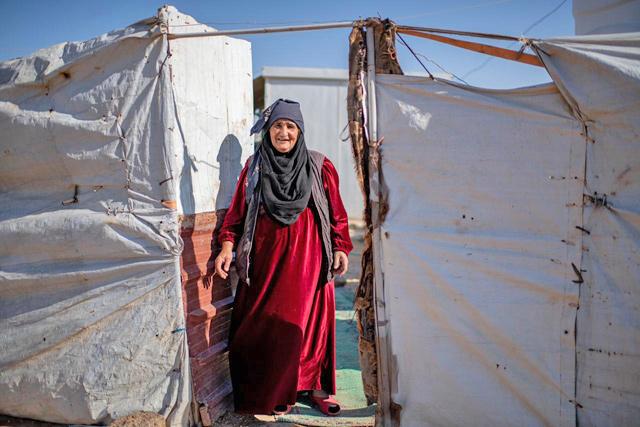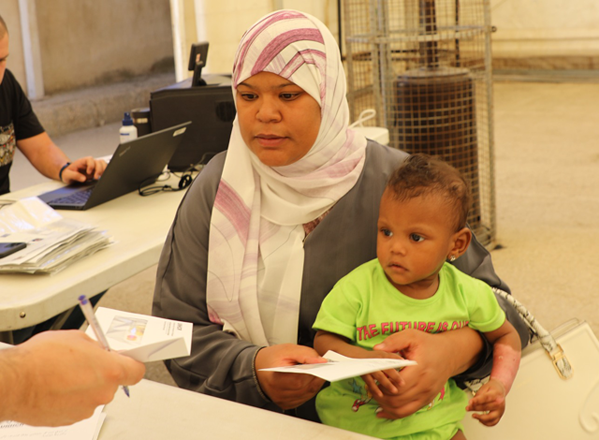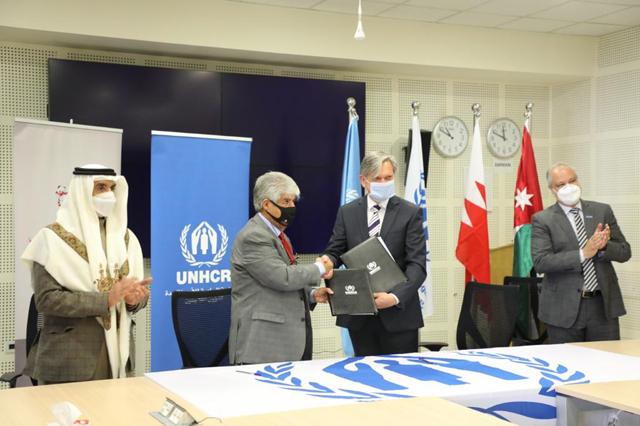You are here
UNHCR takes stock of 2019 operations, urges international support for refugees
By JT - Dec 28,2019 - Last updated at Dec 28,2019

Despite its work to support refugees throughout the year, UNHCR’s operation in Jordan was only 58 per cent funded at the end of 2019, according to the agency (Photo courtesy of UNHCR)
AMMAN — As 2019 comes to a close, the number of refugees registered in Jordan currently stands at 744,795, according to a recent statement from the UNHCR.
The number includes approximately 655,000 Syrians, 67,000 Iraqis, 15,000 Yemenis, 6,000 Sudanis and 2,500 refugees from a total of 52 other nationalities, the statement said.
Building on the successes of previous years, UNHCR has continued to provide protection, health, education, cash assistance for basic needs and livelihood support among other services to refugees of all nationalities throughout the year, according to the statement.
Despite its work to support refugees throughout the year, UNHCR’s operation in Jordan was only 58 per cent funded at the end of 2019, noted the statement.
Although support from the international community, including major donors such as the United States, Germany, United Kingdom, Canada and the European Union, has been “graciously welcomed, it remains evident that prioritisation of the needs of refugees in 2020 is much needed if UNHCR is to continue helping the most vulnerable families in Jordan”, read the statement.
With 83 per cent of refugees living outside refugee camps in urban areas, in 2019 UNHCR Jordan continued to operate a one-refugee approach in its response to refugees.
Just over 40,000 refugee families of all nationalities were reached with monthly multipurpose cash assistance throughout the year, costing an average of $5.5million each month, and so far around 76,000 families have received one-off winterisation cash assistance to help cover needs such as rent, heating and warm clothes throughout the winter months, the statement said.
Over the course of the year, UNHCR and partners continued to provide healthcare services to refugees in Jordan.
In April, the decrease of medical costs for Syrian refugees in Jordan, to the uninsured Jordanian rate, “marked a significant step forward demonstrating the generosity that the Government of Jordan has shown towards refugees and what can be achieved when the international community stands in solidarity with host countries”.
Over 328,000 medical consultations have been provided to refugees throughout the country and over $1.3 million has been distributed under the cash for health project to refugees in need of emergency care.
Referrals of emergency cases from inside Zaatari and Azraq refugee camps to urban hospitals for further treatment have also totalled 15,000 cases.
UNHCR’s focus on improving access to higher education for refugees inside and outside of Jordan also continues with 592 refugee students currently studying at Jordanian universities under the DAFI scholarship programme.
In 2019, young people were also supported to access scholarships at higher education institutions in third countries like Japan, Canada and the UK.
Innovation also featured heavily in UNHCR’s education approach. Early 2019 saw the launch of a network of 10 innovative Connected Learning Hubs in community centres across the Kingdom enhancing education opportunities and access to online learning for refugees of all ages.
In addition, UNHCR continued to emphasize the need to support Jordanians in the local community as well as refugees. A new partnership with Luminus Technical University College, for example, has seen over 50 refugees and Jordanian youth embark on diploma courses.
Recognising the need to support local Jordanians boost their economic welfare alongside refugees, over 100 home-based businesses have been registered through UNHCR’s partnership with Blumont following the decision of the Jordanian Government to allow refugees to license and operate businesses from home in late 2018.
In addition, the cumulative number of work permits issued to Syrian refugees in Jordan currently stands at around 165,000, representing 45 per cent of the working age population, the statement said.
Permitting refugees to work in the sectors of agriculture, manufacturing, construction and some hospitality industries, and as recognised at the recent Global Refugee Forum in Geneva, Jordan is one of the countries leading the way when it comes to refugee employment, noted the statement.
More still needs to be done, however, in improving the access of women to the labour market and supporting non-Syrian nationalities, the UN agency said.
By the end of 2019, a total of 5,952 individuals were submitted for resettlement to 13 countries and over 5,000 refugees have departed this year to rebuild their lives in a third country, the agency continued.
In line with global trends, however, the number of resettlement places available for refugees in Jordan continues to decrease and remains far from meeting the estimated 75,000 refugees who need resettlement from Jordan.
Additionally, 30,000 Syrian refugees returned home from Jordan in 2019. Although the flow of returns has remained steady throughout the year, refugees in Jordan continue to cite safety, security and a lack of services and work opportunities as the main reasons hindering their return.
Responding to the protection needs of refugees, a community-based approach has seen 37 mobile helpdesks operate in eight different governates in Jordan where refugees can approach UNHCR with any legal and protection issues they dace outside of the main centres in Amman, Irbid, Mafraq, Zaatari and Azraq.
In coordination with partners, UNHCR has provided around 75,000 legal consultations for refugees in 2019 and continues to work with government ministries in leading trainings on refugee rights and responsibilities in order to build capacity.
Related Articles
AMMAN — A Syrian family is facing an eviction threat for not being able to pay their rent in Zarqa.
AMMAN — With an additional 20.4 million euros to UNHCR, the UN Refugee Agency, made available through a special-purpose contribution, German
AMMAN — UNHCR, the UN Refugee Agency signed a $1 million agreement with the Royal Humanitarian Foundation (RHF) of Bahrain to support Syrian














